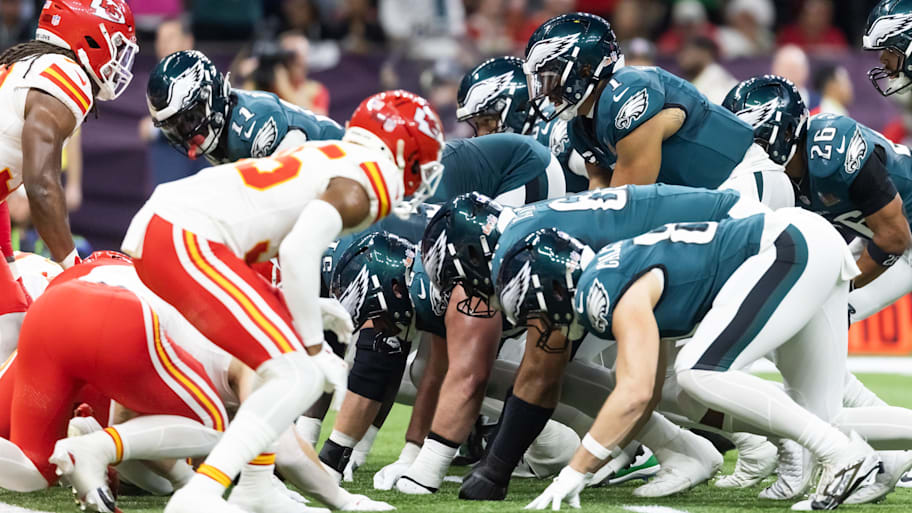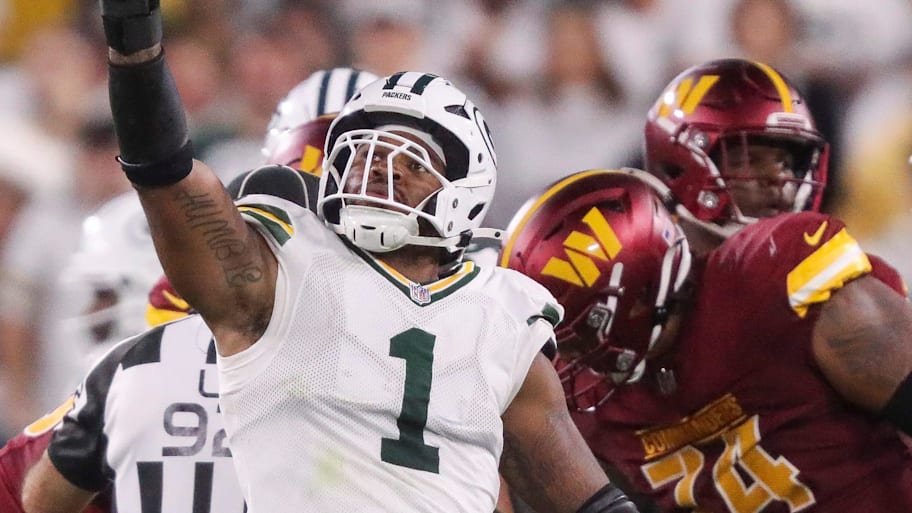
In our MMQB preseason predictions, I picked an NFC championship between the Eagles and the Packers (before the Micah Parsons trade). We are only two weeks in, but early results are strong. All the Eagles do is win, and the Packers are playing at the highest level in the league. With that, I thought I’d reexamine the tush push debate, talk about the Eagles’ salary cap tactic and revel in the Packers’ early success.
Tush pushing away
After the Eagles literally plowed their way to victory over the Chiefs on Sunday, there is much consternation about the way they are winning; specifically, the tush push. Notwithstanding the uncalled offside penalties, the play continues to draw rebuke from fans, commentators, officials and other teams. And I just don’t get it.
When we last left the tush push, the Packers had introduced a proposal to ban it, requiring a three-quarters majority from the teams to end the play. With politicking on both sides, it was unclear whether the anti-tush push crowd had the votes. That possibility ended when Eagles owner Jeffrey Lurie spoke before team owners, emphasizing statistics showing that the play is actually safer than other football plays. Lurie also brought along an ace card in the uber-popular Jason Kelce, who said comments attributed to him about the play “beating him up” were overblown, and that if he could only do tush push plays, he wouldn’t have retired. The comments resonated, the votes to ban were not there and the play survived, at least for 2025.
Whatever the whining is about the play—it’s not football, it’s a rugby scrum, it’s ugly, etc.—people have to get over it. And, of course, any team—your team—is free to run it. What is astounding about the tush push is not that the Eagles run it so effectively. Rather, it is that every other team either chooses not to run it and/or is ineffective in doing so.
There will be hand-wringing about the play up through the 2026 NFL owners’ meetings. Until then, the Eagles’ competitive advantage will continue.
That was the Eagles on the field. As for the Eagles off the field …
Voidable years
Since the advent of the NFL salary cap in 1993, teams have been able to prorate signing bonus amounts over the length of player contracts, creating cash over cap imbalances and favoring teams willing to risk a lot of up-front cash. The Eagles have accelerated the proration game with the liberal use of voidable years, as discussed in recent articles in both The Athletic and The Wall Street Journal.
In simplest terms, these are extra “fake” years added to the back portion of contracts that are automatically voided—they simply vanish—before they become real. It allows teams to lower short-term cap charges, pushing more prorated charges into the future. Obviously, a $40 million bonus prorated over two years ($20 million per year) is more burdensome short-term than it would be if prorated over the maximum allowable five years ($8 million per year). And, in this example, the $24 million in cap charges deferred into the three void years won’t load into the salary cap until a time when the cap has risen to a much higher level than the present.
Of course, to use this tactic, owners must be willing to fund large signing bonuses, renegotiated signing bonuses, option bonuses, etc. When asked about it, Lurie has said he is happy to “fund” this tactic to help the team’s efforts, and has done so to the tune of a whopping $380 million in future cap charges now attached to Eagles’ voidable years, far greater than any other team.
Commissioner Roger Goodell recently made some veiled references to “the integrity” of the cap regarding this tactic, which tells me some owners are not fond of what Lurie and others are doing. And certainly the NFLPA will, or should, fight any attempt to restrict owners from doing this in any CBA negotiation.

Packers playing at another level
I realize that bias is something people in the media are not supposed to have but (1) I am not traditional media, (2) I spent 10 years working for the Packers and (3) who cares, we’re not robots. It’s obviously early in the season, but … wow.
In five days, the Packers made two teams that went to the divisional round of the playoffs last year (Lions) and NFC championship game (Commanders) seem like they were JVs playing the varsity. The Packers are playing at another level. They were, in my opinion, a Super Bowl–contending team before the Parsons trade—I picked them to lose in the NFC championship to the Eagles—and now Parsons has elevated the entire team.
It is still hard to fathom that they acquired Parsons. Players like him—a premium player at a premium position at a premium age (26)—never come available. A big part of my job as cap manager/contract negotiator with the Packers was to make sure a player like that would never walk out that door. I also know how much the Packers love their draft choices, especially their high ones, so we know what a special player Parsons is for them to give up two first-rounders, even if people viewed that as light. And they got him.
For anyone who has worked in team sports for a while, you know when you have “the team” that can win it all. In my 10 years with the Packers, I knew the years we had that, especially the year we lost a playoff game to the Eagles that included a fourth-and-26 conversion against us, or the year a young Michael Vick came into Lambeau on a snowy night and beat us in the playoffs. We had the team to win it all those years, but did not. That’s why those games were so hard to lose and stung for a long time. In other years, we knew we did not have that team.
Yes, I know: It’s early and I’m biased, but the Packers look very much like they have “the team” to win it all this year.
Brady tolerance
The debate over Tom Brady's role as a broadcaster and partial NFL owner surfaced again after the Monday Night Football game showed him in the Raiders coaches' box wearing a headset.
Last year, Brady was not allowed to participate in the regular production meetings with teams before broadcasting their games due to this perceived conflict. This year, the rules have been relaxed to allow him to do so virtually. To me, it’s all silly. Do we really think that Brady’s broadcast colleagues — fellow announcers and producers — are not going to share with him everything they learned? Please.
The issue is not so much that Brady will find out plays that teams run and tell his Raiders coaches, although he certainly can. Or that he hears some scoop about a team that could help the Raiders down the road. The issue is more the appearance in a league that cares deeply about appearance. Can we imagine Jerry Jones or Robert Kraft sitting in broadcast meetings about an Eagles-Giants game?
Listen, as someone who has held many different roles, I understand conflict of interest and accept that it happens all the time. But this one is very public. The NFL is going to continue to squirm around it in allowing a partial owner to be a national broadcaster.
Once again, greater talent equals greater tolerance.
This article was originally published on www.si.com as Business of Football: Eagles Taking Advantages Other Teams Choose Not To.







